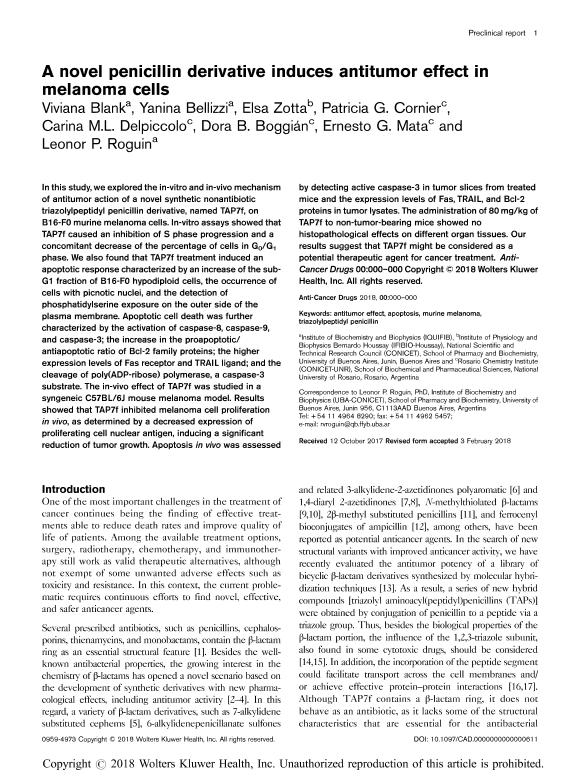Artículo
A novel penicillin derivative induces antitumor effect in melanoma cells
Blank, Viviana Claudia ; Bellizzi, Yanina
; Bellizzi, Yanina ; Zotta, Elsa; Cornier, Patricia Griselda
; Zotta, Elsa; Cornier, Patricia Griselda ; Delpiccolo, Carina Maria Lujan
; Delpiccolo, Carina Maria Lujan ; Boggián, Dora B.; Mata, Ernesto Gabino
; Boggián, Dora B.; Mata, Ernesto Gabino ; Roguin, Leonor Patricia
; Roguin, Leonor Patricia
 ; Bellizzi, Yanina
; Bellizzi, Yanina ; Zotta, Elsa; Cornier, Patricia Griselda
; Zotta, Elsa; Cornier, Patricia Griselda ; Delpiccolo, Carina Maria Lujan
; Delpiccolo, Carina Maria Lujan ; Boggián, Dora B.; Mata, Ernesto Gabino
; Boggián, Dora B.; Mata, Ernesto Gabino ; Roguin, Leonor Patricia
; Roguin, Leonor Patricia
Fecha de publicación:
06/2018
Editorial:
Lippincott Williams
Revista:
Anticancer Drugs
ISSN:
0959-4973
Idioma:
Inglés
Tipo de recurso:
Artículo publicado
Clasificación temática:
Resumen
In this study, we explored the in-vitro and in-vivo mechanism of antitumor action of a novel synthetic nonantibiotic triazolylpeptidyl penicillin derivative, named TAP7f, on B16-F0 murine melanoma cells. In-vitro assays showed that TAP7f caused an inhibition of S phase progression and a concomitant decrease of the percentage of cells in G 0 /G 1 phase. We also found that TAP7f treatment induced an apoptotic response characterized by an increase of the sub- G1 fraction of B16-F0 hypodiploid cells, the occurrence of cells with picnotic nuclei, and the detection of phosphatidylserine exposure on the outer side of the plasma membrane. Apoptotic cell death was further characterized by the activation of caspase-8, caspase-9, and caspase-3; the increase in the proapoptotic/ antiapoptotic ratio of Bcl-2 family proteins; the higher expression levels of Fas receptor and TRAIL ligand; and the cleavage of poly(ADP-ribose) polymerase, a caspase-3 substrate. The in-vivo effect of TAP7f was studied in a syngeneic C57BL/6J mouse melanoma model. Results showed that TAP7f inhibited melanoma cell proliferation in vivo, as determined by a decreased expression of proliferating cell nuclear antigen, inducing a significant reduction of tumor growth. Apoptosis in vivo was assessed by detecting active caspase-3 in tumor slices from treated mice and the expression levels of Fas, TRAIL, and Bcl-2 proteins in tumor lysates. The administration of 80 mg/kg of TAP7f to non-tumor-bearing mice showed no histopathological effects on different organ tissues. Our results suggest that TAP7f might be considered as a potential therapeutic agent for cancer treatment.
Palabras clave:
ANTITUMOR EFFECT
,
APOPTOSIS
,
MURINE MELANOMA
,
TRIAZOLYLPEPTIDYL PENICILLIN
Archivos asociados
Licencia
Identificadores
Colecciones
Articulos(IQUIFIB)
Articulos de INST.DE QUIMICA Y FISICO-QUIMICA BIOLOGICAS "PROF. ALEJANDRO C. PALADINI"
Articulos de INST.DE QUIMICA Y FISICO-QUIMICA BIOLOGICAS "PROF. ALEJANDRO C. PALADINI"
Articulos(IQUIR)
Articulos de INST.DE QUIMICA ROSARIO
Articulos de INST.DE QUIMICA ROSARIO
Citación
Blank, Viviana Claudia; Bellizzi, Yanina; Zotta, Elsa; Cornier, Patricia Griselda; Delpiccolo, Carina Maria Lujan; et al.; A novel penicillin derivative induces antitumor effect in melanoma cells; Lippincott Williams; Anticancer Drugs; 29; 5; 6-2018; 416-428
Compartir
Altmétricas



